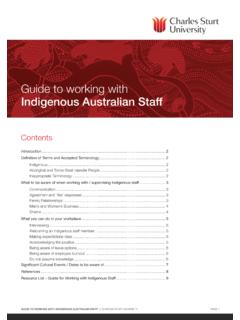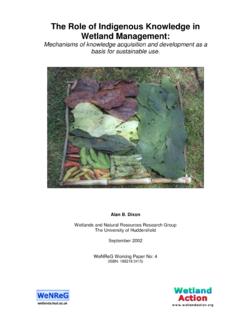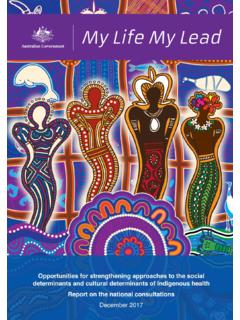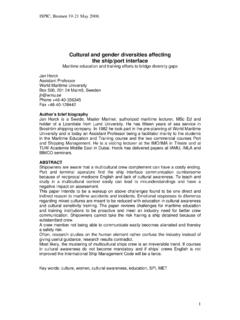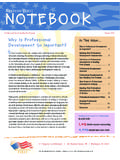Transcription of Responsibilities and Relationships: Decolonizing …
1 Responsibilities and Relationships: Decolonizing the BC Food Systems Network A CFICE project report Prepared by: Dawn Morrison, Director, Working Group on indigenous Food Sovereignty Abra Brynne, Director, Engagement and Policy, BC Food Systems Network Prepared for: Community First Impacts of Community Engaged Research December 2016 2 Background The BC Food Systems Network received funding from the Communities First: Impacts of Community Engagement funds for a project that ran from December 2015 through July 2016. This report contains the original project intent as well as the lessons learned and reflections on the process from two of the key BCFSN staff involved. Project Title: Responsibility and Relationships: Decolonizing the British Columbia Food Systems Network / Indigenizing our Praxis Project Summary and Goals The BCFSN strives to build and maintain networks inclusive of diversity of cultures including indigenous and non- indigenous communities.
2 In 2012, with support from Community First: Impacts of Community Engagement s (CFICE) Community Food Security (CFS) Hub the BCFSN staff developed an evaluation to better understand how we can build our cross cultural Recently, the BCFSN received funding that provides us with the opportunity to explore what has been achieved in the intervening years as well as what it means to truly decolonize our praxis in the day-to-day activities and conversations of staff and network members. We are working to understand what is the best and most appropriate relationship between our largely settler Network and the Working Group on indigenous Food Sovereignty (WGIFS) who carries the voice and vision of indigenous hunting, fishing, farming and gathering communities who have persisted throughout colonization.
3 Building on the existing Decolonizing Research and Relationships Methodology developed by the WGIFS, this project provides the time and space to reflect and deepen the understanding between core staff at the BCFSN on how we can advocate for more sustainable and just food systems in a way that is informed by indigenous paradigms, protocols and practices. This project proposes to seek deeper understanding of the ways the indigenous food sovereignty is being expressed, and will provide a framework for future community based research to ensure it aligns with the values and visions of the WGIFS in the 4th world reality in which we live. Our efforts to decolonize our language, practice, and paradigm can contribute to building more respectful and effective community-campus relationships between academia and indigenous communities.
4 The Network has determined that in order to truly support food sovereignty in the region in which we work, we must better understand the impacts of colonization on both indigenous and settler communities. Food sovereignty is founded on principles, practices, and policies of social and environmental justice. There can be no food sovereignty for Canadians until we redesign institutional frameworks to support and implement Aboriginal Title and Rights that will enable indigenous peoples to protect, conserve and restore the complex system of bio-cultural heritage in the land and food system as a whole. 1 The final report was titled, Cross-Cultural Food Networks: Building and Maintaining Inclusive Food Security Networks to Support indigenous and Non- indigenous Communities and was authored by Dayna Chapman and Wanda Martin, and the BC Food Systems Network.
5 Copies of the report are available through CFICE and the BCFSN. 3 Project Outcomes The remainder of this document relates the lessons learned over the course of the project, from the perspective of Dawn Morrison and Abra Brynne. In Dawn's As the Co-Founder and Director of the Working Group on indigenous Food Sovereignty, I have been consistently engaging indigenous communities in food sovereignty meetings, discussions and conferences since 2006. I am grateful for the support from CFICE that has made it possible to realize myself in my roles and Responsibilities of organizing, facilitating and translating underlying issues, concerns, situations and strategies identified by indigenous hunters, fishers, farmers and gatherers in the BC Food Systems Network meetings, gatherings and beyond.
6 The project has challenged me to find ways of overcoming high level of stress, tension and burden of educating, informing, and holding the space for highly contentious and triggering conversations associated with historical injustices and systemic racism instituted within the agricultural policies and practices, and the ongoing destruction of indigenous land, water, food, and bio-cultural heritage. I offer my reflections and insights for the purposes of building my internal capacity to mentor and share leadership with younger generations of indigenous and non- indigenous peoples who will be left with the legacy of upholding our sacred Responsibilities to one another, and the land, plants and animals that provide us with our food. In the context of the larger whole of relationships, my personal reflections highlight the need to make systemic change by de-professionalizing relationships in community based research, and balancing out the burden of responding to the proclamations of truth and reconciliations made by settler societies.
7 Responding to truth and reconciliation in a deeper more meaningful way will require additional supports (financial, technical and human) to enable the WGIFS to facilitate the development of research, actions and policy proposals for and by indigenous peoples, and develop our organization in an autonomous and complimentary relationship to food system networks and coalitions being led by non- indigenous friends and allies. The Responsibilities and Relationships: Decolonizing the BC Food Systems Network project provided the time and space for the staff of the BC Food Systems Network (BCFSN) and Working Group on indigenous Food Sovereignty (WGIFS) to collaborate more effectively in generative learning, and organize time and space for analyzing and Decolonizing the food system discourse within the cross cultural interface where indigenous food sovereignty meets sustainable agri-food systems networks.
8 The document titled Decolonizing Food Systems Discourse: Contentious and Complimentary Terms outlines more culturally appropriate language and terminology that was highlighted in the cross cultural discussions. The project gave concentrated time and space to increasing understanding of the ways in which indigenous land, food, water, cultures, and economies have been severely impacted by the historical injustices of Indian Residential School, and oppressive colonial land, water and agricultural policies and frameworks. Much of the conversational learning took place at regular staff meetings where we engaged in a collaborative process of developing and analyzing the network evaluation. The evaluation provided opportunities to learn about theories of change, and articulate and validate indigenous worldviews and the transformational methods of Decolonizing research and relationships to one another, and the land, water, plants, and animals that provide 4 us with our food.
9 The cross cultural learning was significant in the ways it allowed for deep reflection on our collective ability to overcome adversity and realize the potential that exists within the gaps of knowledge where potential for future collaboration exists. Building on the experiences and insights accumulated over the last 10 years of mobilizing indigenous communities and their food related knowledge systems, the generative conversations brought deeper meaning and understanding to some key points of contention within the interface where sustainable agri-food system advocates meet indigenous hunting, fishers, farmers and gatherers on a broader ecological, cultural and temporal scale. indigenous hunters, fishers, farmers and gatherers have created some of the most sustainable adaptation strategies of humanity, and are on the front lines resisting destruction of the remaining fragments of bio-cultural heritage.
10 indigenous peoples are leading campaigns that offer solutions to many serious environmental and social justice issues, concerns and situations that impact people of all cultures. Yet we remain vulnerable in the disparity that exists in funding programs, policy proposals, administrative and technical capacity, and social determinants of health outcomes at large. The worldviews of the myriad of indigenous peoples are similar, in the ways we understand the world is interconnected, and our diverse realities are entangled as parts of a large whole. In a similar spirit and worldview as the Standing Rock Sioux who have gained international recognition, for the ways in which they brought together people of all creeds and cultures from around the world to protect the water in the Missouri River, the WGIFS has been calling on settler society to stand in solidarity with indigenous peoples who are leading campaigns and actions to protect lands, waters and biodiversity for present and future generations.
